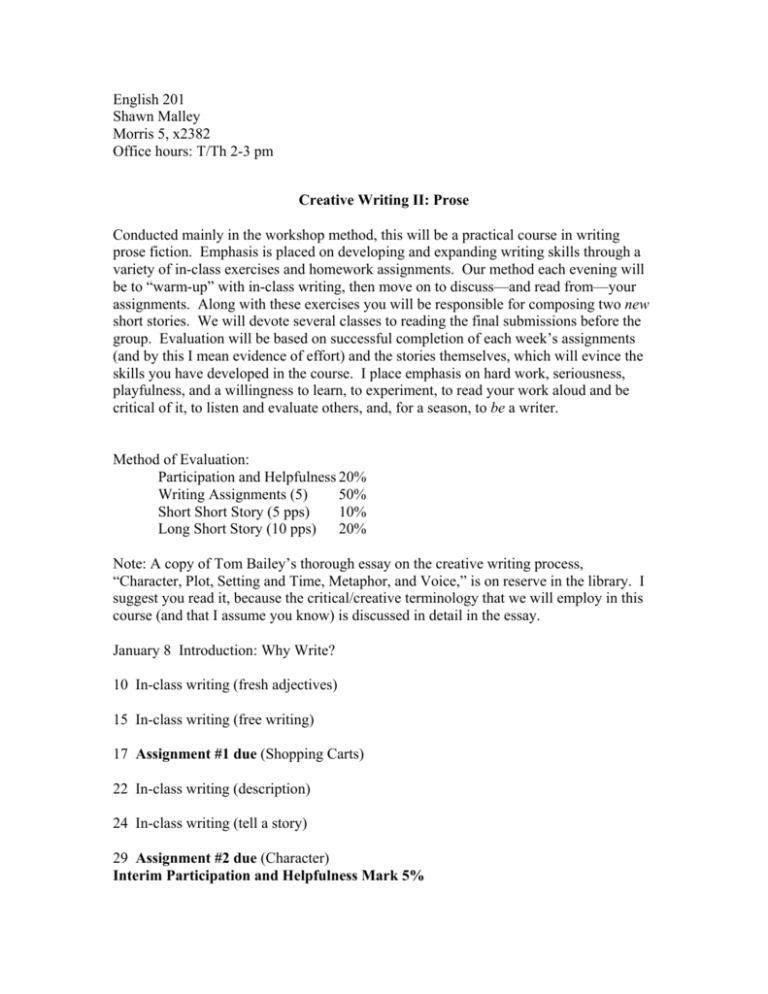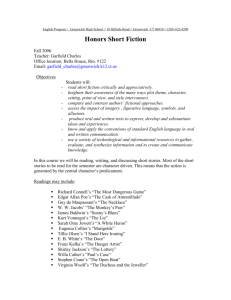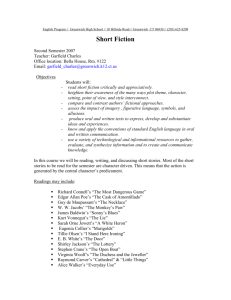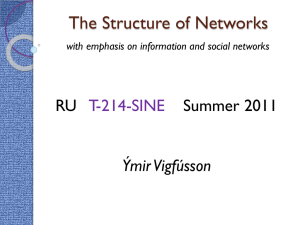ENG 201 Creative Writing II
advertisement

English 201 Shawn Malley Morris 5, x2382 Office hours: T/Th 2-3 pm Creative Writing II: Prose Conducted mainly in the workshop method, this will be a practical course in writing prose fiction. Emphasis is placed on developing and expanding writing skills through a variety of in-class exercises and homework assignments. Our method each evening will be to “warm-up” with in-class writing, then move on to discuss—and read from—your assignments. Along with these exercises you will be responsible for composing two new short stories. We will devote several classes to reading the final submissions before the group. Evaluation will be based on successful completion of each week’s assignments (and by this I mean evidence of effort) and the stories themselves, which will evince the skills you have developed in the course. I place emphasis on hard work, seriousness, playfulness, and a willingness to learn, to experiment, to read your work aloud and be critical of it, to listen and evaluate others, and, for a season, to be a writer. Method of Evaluation: Participation and Helpfulness 20% Writing Assignments (5) 50% Short Short Story (5 pps) 10% Long Short Story (10 pps) 20% Note: A copy of Tom Bailey’s thorough essay on the creative writing process, “Character, Plot, Setting and Time, Metaphor, and Voice,” is on reserve in the library. I suggest you read it, because the critical/creative terminology that we will employ in this course (and that I assume you know) is discussed in detail in the essay. January 8 Introduction: Why Write? 10 In-class writing (fresh adjectives) 15 In-class writing (free writing) 17 Assignment #1 due (Shopping Carts) 22 In-class writing (description) 24 In-class writing (tell a story) 29 Assignment #2 due (Character) Interim Participation and Helpfulness Mark 5% 31 In-class writing (post-card) February 5 In-class writing (tone and effects) 7 Assignment #3 due (On the Job) 12 In-class writing (prose analysis) 14 In-class writing (Valentine’s Day) 19 Assignment #4 due (Dramatic Monologue) 21 In-class writing (fill in the blanks 1) First Story Due Thursday, February 21 Reading Week March 5 In-class writing (story endings) 7 In class writing (fill in the blanks 2) 12 Assignment #5 (Point of View) 14 Writing workshop Day 19 Story reading and editing workshop 21 Story reading and editing workshop 26 Story reading and editing workshop 28 Story reading and editing workshop April 2 Story reading and editing workshop 4 Story reading and editing workshop Final Story due by Monday, April 9 Participation and Helpfulness Grading Scheme Criteria 9-10 7-8 Points 1-3 0 Student always attends classes. Student regularly attends classes. Student often misses classes. Student rarely attends classes. ____ Level Of Engagement In Class Student proactively contributes to class by offering ideas and asking questions at least once per class. Student proactively contributes to class by offering ideas and asking questions once per class. Student rarely contributes to class by offering ideas and asking questions. Student never contributes to class by offering ideas and asking questions. ____ Listening Skills Student listens when others talk, both in groups and in class. Student incorporates or builds off of the ideas of others. Student listens when others talk, both in groups and in class. Student does not listen when others talk, both in groups and in class. Student does not listen when others talk, both in groups and in class. Student often interrupts when others speak. ____ Preparation Student is always prepared for class with assignments and required class materials. Student is almost always prepared for class with assignments and required class materials. Student is rarely prepared for class with assignments and required class materials. Student is almost never prepared for class with assignments and required class materials. ____ Attendance Total----> ____






